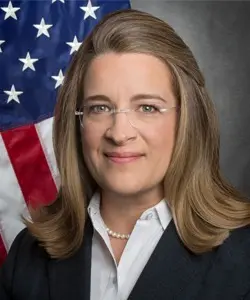
Annie Caputo
Commissioner, U.S. Nuclear Regulatory Commission
BSNE ’96, UW-Madison
Each year, the College of Engineering recognizes outstanding alumni during Engineers’ Day—a celebration of engineers, held on Homecoming weekend. Annie Caputo is among the engineers we will honor in 2019 at an Oct. 11 banquet.
When Annie graduated from college in 1996, job prospects for nuclear engineers were less than stellar. However, armed with additional experience in communications, she accepted a position in Chicago as an engineer and executive assistant with Commonwealth Edison. She leveraged that experience into quickly becoming a congressional affairs manager for the company.
That experience set the course for her career. She and her family relocated to Washington, D.C., where she later took a position on the professional staff for the U.S. House Committee on Energy and Commerce, focusing on nuclear energy issues and supporting development of the Energy Policy Act of 2005.
For 13 years, Annie served on Capitol Hill as staff for the House Energy and Commerce Committee and the U.S. Senate Environment and Public Works Committee. In May 2018, she was sworn in as a commissioner on the U.S. Nuclear Regulatory Commission.
We are honoring Annie as a leader whose policy work and dedication make a difference nationally and inspire young engineers.
Recently, we chatted with her about everything from her memories as a student at UW-Madison to her career and hobbies. Here are her responses to some of our questions.
How did you choose to attend UW-Madison?
I chose UW-Madison ultimately because I wanted to pursue a degree in nuclear engineering. I had studied chemical engineering for a while at Michigan Tech but took a break in my education and moved to Colorado. During a trip home to visit my mom, she surprised me with an interview at UW-Madison in the nuclear engineering department and I was sold. Not long after, I moved home to restart my education at UW.
As a student, how did you spend your free time?
As a nontraditional student trying to resuscitate my math skills and survive Dr. Witt’s homework sets, Dr. Vogelsang’s labs, and Dr. Corradini’s tests, I didn’t have much spare time. I was active in the student chapter of the American Nuclear Society and attended conferences when I could. I also managed to squeeze in visits to Michael’s Frozen Custard, but who doesn’t!
What was your favorite class?
Reactor Operations was my favorite, despite starting at 7:45 a.m. five days a week. Learning to run the research reactor and conduct experiments really brought together the physics and the engineering work we were doing in our other classes. It was a rigorous curriculum but our strong camaraderie made it fun. And it really brought home what it means to be an engineer and actually see science put into practical use. That, to me, is what engineering is all about.
How did your experiences in the college influence your career path?
Significant advances in nuclear engineering were being pursued by people who were exceptionally brilliant. One thing became clear: There were big challenges ahead for nuclear technology in policy and public communications. I decided to explore this career path and took extra classes to develop a better understanding of relevant subject areas. This was an unusual choice at the time, but it was definitely the right path for me.
Who has played the greatest role in your achievements?
My husband. Even though he teases me for being a geek, he has always been right there supporting me through every twist and turn of my career.
What are your hobbies?
I am a quilter. I picked it up about 15 years ago. It’s something my grandmother did long before I was born and something my kids and I enjoy together.
Is there anything else you would like us to know?
I’m proud to say I knew Dr. Wilson when he was a new PhD student. The fact that I was several years older and restarting my bachelor’s degree made me feel like a slacker in comparison, but he was an inspiration to me, and I will always cherish his friendship.